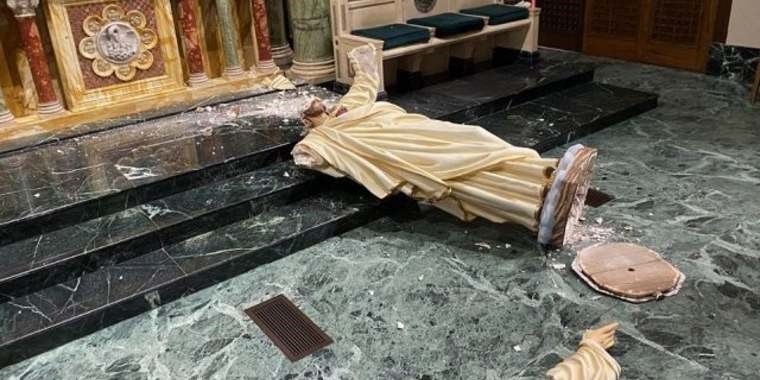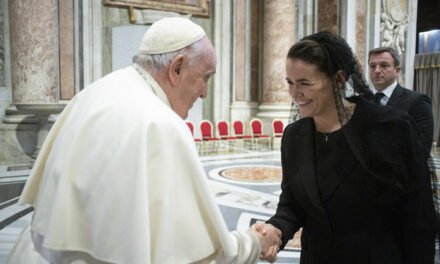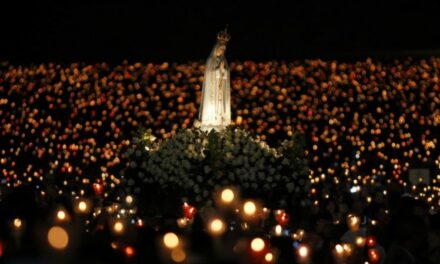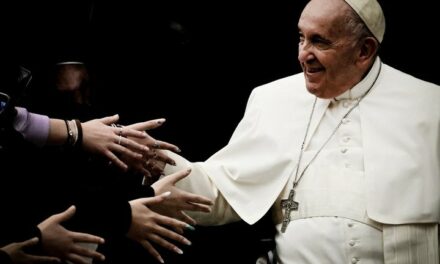There are huge historical and political differences between the individual countries of Europe, but in general it is typical that the West is gradually moving away from the Judeo-Christian tradition and culture. The so-called secular intolerance has become a trend in Western Europe, the essence of which is that certain strong ideological influences lead to the relegation of the Christian religion to the background. Madeleine Enzlberger, head of the Vienna-based European Monitoring Center for Intolerance Against Christians (OIDAC), spoke about all of this to Kossuth Rádó's Sunday newspaper program in connection with the publication of the organization's latest report investigating discrimination against Christians.
Their report was also published on a Hungarian website, and the title of the report was that violence against Christians is increasing in five European countries. For you, what are the main conclusions and findings from their latest report?
- We investigated the situation in France, Germany, Spain and Sweden, as well as in the United Kingdom, and unfortunately we had to conclude that from 2019 to 2020, the number of violent acts increased by about 70 percent. But what do we mean by violence? On the one hand, we mean the many forms of hate crime, the definition of which we also cooperate with the OSCE. Definition of hate crime; a crime motivated by prejudice against a distinct group. So, in this case, violence does not just mean one person physically abusing another - which, fortunately, is not very common when we consider hate crimes against Christians. What we often experience is vandalism against churches and Christian buildings. For example, based on the 2019 compilation of the French Ministry of the Interior, at least one church or Christian building was vandalized every day of the year in the country, which is a very significant number.
Madeleine Enzlberger added that two main components were also found to be driving these cases.
"One is what we call secular intolerance, while the other is based on Islam. In the case of violent acts, the main driving force is the former, cases controlled by secular, irreligion."
Are they investigating who are the perpetrators of these vandal acts? For example, young people who think it's fun to vandalize a Christian monument or building?
– Yes, sometimes it is teenagers, but we do not usually classify them as violence against Christians, especially if it turns out that the perpetrators were really children or teenagers. We want to be sure that we only register prejudices against the church as an institution and the Christian religion as such. What emerges from this is that there are many left-wing extremist groups that are behind the cases committed, especially when the causes are abortion, homosexual marriage and similar topics.
In other words, are we talking about people who consciously target churches and everything that the church as a religion means to them?
"Yes." Hate crimes are always also message crimes, with which they intend to send a message to whole groups, such as groups based on a common religion. Let's say the mildest message is that "only a burning church is a good church". But there is also an unfortunate amount of arson, especially in France. However, violence is not the only problem we see. There are many cases in which we find that the freedom and human rights of Christians are being violated. Most often, it is about freedom of religion, but it also includes issues of freedom of conscience.
Parental rights are regularly violated, as are various other freedoms. The main reason for this is that secular intolerance has become a European trend, the essence of which is that the driving force behind secularization is a strong ideological factor.
Ideology can appear in a very radical form, which defines itself against religion in general, but especially against Christianity.
Can "Christian societies" that are built on the Judeo-Christian religious heritage still be called Christian societies when such phenomena are rearing their head in increasing numbers?
- All of Europe has a Jewish-Christian historical past, and I think that each country should be examined separately. In the case of each of them, their own social environment, their own culture, history, and political system must also be taken into account. The differences between, say, Germany and France are enormous. While France is characterized by a very characteristic specific system, laicity, part of which is that the state owns most of the church estates, in Germany the relationship between the state and the church is completely different. These factors shape the form in which intolerance against the Church appears. It is also present in France, but in Germany, for example, there is a very high rate of self-censorship among Christians, although not equally in the western and eastern parts of the country. So there are huge historical and political differences between the individual countries, but it is typical of Europe in general that the West is gradually moving away from the Judeo-Christian tradition and culture.
"The parallels are very clear. In Europe, we see soft persecution, for example in the workplace, say in the medical field"
Benedict Kiely, a Catholic priest from London , told the Sunday newspaper .
"In some countries, doctors - because of their moral convictions - are forced to give up their jobs because, for example, they refuse to perform abortions. At a conference, we heard Paivi Rasanen, a member of the Finnish parliament, being threatened with prison just because he quoted from the Bible. So no one is currently in danger of being legally beheaded for their faith. However, things happen in stages. For the parallels, I usually give the example that in Muslim-majority countries, Christians are always second-class citizens, they always enjoy fewer rights, to a lesser or greater extent, and there are no exceptions to this. We are slowly seeing this happening in Europe. That Christians are becoming, if not a persecuted minority, but lower-ranking and less-than-full-right citizens is their faith."
"In the Middle East, I have personally seen the enormous work that Hungary is doing. I have often heard the deepest appreciation for Hungary in Iraq and Syria. An Iraqi bishop told me that out of all the countries in the world, he felt the most respect from Hungary. Hungary is excellent, and Hungarians can be very proud of the work they do for persecuted Christians," explained Benedict Kiely.
Source: Kossuth Rádió / hirado.hu
Cover image: Illustration / Catholic Diocese of El Paso












